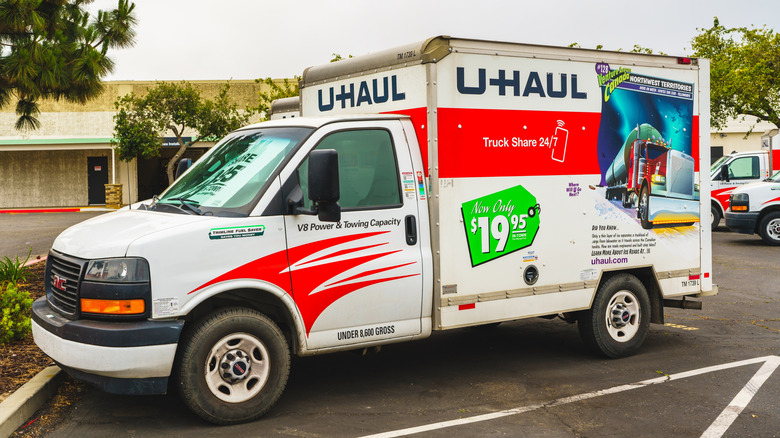Why All U-Haul Trucks Have Arizona License Plates
U-Haul has been serving the North American DIY moving market since its first trailer appeared for hire over 80 years ago. The company was the brainchild of L.S "Sam" Shoen and his wife Anna Mary Carty Shoen. The story began when Sam was discharged from the Navy in 1945. The couple wanted to move from Los Angeles to Portland, Oregon, and discovered that it was impossible to hire a trailer for the move.
The seed of an idea was sown, and during the drive to Portland, they worked on the U-Haul business model. By the end of the '50s, there were 42,600 trailers available for hire across the country. Fast forward to 2020, and the number of trailers, which does indeed include rentable motorcycle transports, had grown to 127,000. Additionally, the company has accrued a fleet of 176,000 trucks of various sizes to consider for renting in 23,000 locations.
However, the more eagle-eyed among you may have noticed one strange detail about U-Hauls. Despite operating across North America, every truck has an Arizona license plate. Why is this? At the core of the answer is an interstate agreement called the International Registration Plan (IRP). Dating from the 1970s, the IRP was designed to allow commercial trucks operating in the U.S. and Canada to use one state to license entire fleets, regardless of where the vehicle is based. No matter if you're renting a U-Haul in Hawaii or Alaska, it will be licensed to Arizona, where its head office is located.
How does the IRP work?
Under the IRP agreement, commercial truck firms can register entire fleets in a single state. This differs from non-commercial car license fees, which are collected by the local DMV office. These fees vary from state to state and are usually allocated to funding roads and similar infrastructure purposes. With commercial fees like those paid by U-Haul, the story is different. Although every vehicle is registered in Arizona, the terms of the IRP agreement mean that license fees (which can reach up to $1000) can end up being split across multiple states.
How much companies like U-Haul have to pay to other states depends on the weight of the truck and the mileage it has accrued in each state. Any U-Haul or other vehicle that is subject to the IRP agreement is considered an "apportionable vehicle." While U-Hauls may not need the same kind of documentation that semi-truck motorists must adhere to, an IRP card must be issued given their classification as an apportionable vehicle. The card lists the truck's registered jurisdiction and its licensed weight.
The amount due to each state is measured using the percentage of the total miles accrued in each state. For example, if a U-Haul truck covered 60,000 miles split equally between Arizona and California, then the fees would also be split equally between the two states. While this means that a U-Haul's mileage has to be closely monitored, it eliminates the requirement to carry separate license plates for each state the vehicle drives through.

